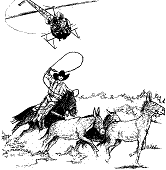Vertebrate Pest Conference: Proceedings

Vertebrate Pest Conference Proceedings: 11th (1984)
Date of this Version
September 1984
Document Type
Article
Abstract
House rats (Rattus rattus) which do not consume a lethal dose of zinc phosphide develop poison-shyness after a single exposure. The surviving poison-shy rats cannot be baited again with zinc phosphide for about three months. Poison-shy rats were separately given anticoagulant baits (brodifa-coum 0.005%, coumatetralyl and warfarin 0.025%) in no-choice tests. The first two anticoagulants were found to be the most efficient ones. It was observed that those R. rattus which had consumed 56.7 mg/kg or more zinc phosphide died sooner (P < 0.05 to 0.1) after anticoagulant poisoning when compared with normal rats. It is conjectured that prothrombin inhibition is accelerated in the liver of poison-shy R. rattus due to the action of phosphine present in the earlier ingested sublethal dose of zinc phosphide.

